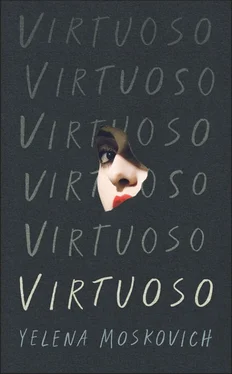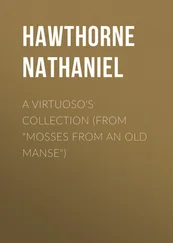Yelena Moskovich - Virtuoso
Здесь есть возможность читать онлайн «Yelena Moskovich - Virtuoso» весь текст электронной книги совершенно бесплатно (целиком полную версию без сокращений). В некоторых случаях можно слушать аудио, скачать через торрент в формате fb2 и присутствует краткое содержание. Город: London, Год выпуска: 2019, ISBN: 2019, Издательство: Serpent's Tail, Жанр: Современная проза, на английском языке. Описание произведения, (предисловие) а так же отзывы посетителей доступны на портале библиотеки ЛибКат.
- Название:Virtuoso
- Автор:
- Издательство:Serpent's Tail
- Жанр:
- Год:2019
- Город:London
- ISBN:978-1-7881-6025-4
- Рейтинг книги:3 / 5. Голосов: 1
-
Избранное:Добавить в избранное
- Отзывы:
-
Ваша оценка:
- 60
- 1
- 2
- 3
- 4
- 5
Virtuoso: краткое содержание, описание и аннотация
Предлагаем к чтению аннотацию, описание, краткое содержание или предисловие (зависит от того, что написал сам автор книги «Virtuoso»). Если вы не нашли необходимую информацию о книге — напишите в комментариях, мы постараемся отыскать её.
Virtuoso — читать онлайн бесплатно полную книгу (весь текст) целиком
Ниже представлен текст книги, разбитый по страницам. Система сохранения места последней прочитанной страницы, позволяет с удобством читать онлайн бесплатно книгу «Virtuoso», без необходимости каждый раз заново искать на чём Вы остановились. Поставьте закладку, и сможете в любой момент перейти на страницу, на которой закончили чтение.
Интервал:
Закладка:
“Oh la la…”
Aimée turned around.
“Don’t tell me…”
The girl was taller, her features velour in the darkness. By the way she stood, Aimée could tell that she was not only older, but already knew who she was and had some agreement from the world about it.
“ Pardon? ” Aimée said.
“That girl. The one you’re watching. Elle est chiante. She’s a waste of time.”
Aimée glanced over at Céline, then back at the girl.
“But you like her, huh?” the girl continued.
Aimée nodded without meaning to.
“What else do you like?” the girl asked.
Aimée hesitated. “…Gin and tonics.”
“Now that’s interesting.”
The girl knew the DJ and bought Aimée all her drinks. The girl was no girl either, but twenty-six to Aimée’s sixteen.
“Hey Dominique!” the girl’s buddy Olivier called out to her. He opened up his cigarette box and pulled out a small baggy with two blue pills. Dominique took the baggy out and tucked it into her bra, then pulled out a cigarette and offered one to Aimée.
Olivier turned to Aimée and said, “You know you’re smoking with a star, right?” and gave her a wink.
At that time, Dominique was a star and felt like one, though her main claim to fame was that theatre piece she’d co-starred in alongside Fanny Ardant, at Théâtre de la Madeleine, which Aimée’s father had taken her to. Fanny Ardant, with her dark brows and dark hair and buttery eyes and her lips imbued with that voice, assured and coy… Fanny Ardant, the woman who was always wearing red, even when she was not. Dominique had assumed that she had the makings of a woman like that, who owned a colour all to herself.
The director had cast Dominique to play Mme Ardant’s younger ghost, somewhere between herself as a child and her daughter. It was a symbolic mise en scène, both women wore sleeveless grey tweed dresses, ending at mid-thigh, then in the last scene both women were in white satin nighties. Fanny Ardant was “Femme”, Woman , and Dominique was “Fille”, Girl .
The last night, the curtain fell and with it descended a vexation within Dominique. Back stage, both actresses washed off their make-up. FEMME went back to being Fanny Ardant, the acclaimed French star. FILLE went back to being Dominique, not quite a shooting star and almost just make-up powder rising into oblivion.
Months after the show, she couldn’t sleep. She’d get up in the middle of the night, turn on the bathroom light, and recite her lines from the show into the mirror.
FILLE (facing FEMME, who is still looking out at horizon)
You scare me.
(takes step closer to FEMME) I never asked to be your likeness.
(another step closer) I never asked the Maker to make me in your image.
(another step) I never asked to spend my whole life carrying your features.
(another step) I never asked to be young when you are already old.
(another step) I never asked for you to grow old before me.
(another step) I never asked for you to die first.
(pause)
I never asked to hear your voice again. (bumps into FEMME)
I never asked to remember your scent. (thrusts more deliberately)
I never asked to feel your hands. (thrust)
I never asked— (thrust)
I never asked— (thrust)
Dominique took off her nightshirt and underwear. Naked, she ran her fingers over the faint bruises on her sternum and just above her pelvis, where she had ‘thrust’ into FEMME in the show. She could almost feel Fanny Ardant’s shoulder and hip ramming into her, as she thrust against her fixed body, pinned to the stage like nails. She could almost hear her own voice, peeling, screeching, her face both humid and icy, her armpits clutching, her legs stiff, and her tear-streaked face and bare feet on the cold stage floor. It was bliss.
Everything changed for Aimée with Dominique. The Seine was made of buoyant water, not mud. She smiled at things just for being there. Céline was no one, an indistinguishable figure among the others.
“Baby, baby, baby…” Dominique was pulling her in from behind.
Just as Aimée was turning seventeen, feeling full of all the things she could do as she was peeling off childhood, Dominique was turning twenty-seven and realising she was no longer the star she had been four years ago, in fact, perhaps, she never had been at all.
When Aimée turned eighteen, Dominique asked her to move in with her.
Aimée traced her finger behind Dominique’s ear as she was standing in front of the large white bookshelf, looking across the spines, choosing which one to pull out. Aimée kissed her neck, and just then Dominique pulled away. She crouched down and ran her finger across the line of spines, and began to pull at the sky-blue hardcover binding of a book wedged in the bottom row.
Dominique’s mother was a vigorous altruist with a shy polyglot hobby from a Catholic parish just outside of Lyon. She had casually managed to acquire a conversational level of Serbian, Spanish, German, Polish and Portuguese. Reaching her thirties with an unintentional pact of celibacy while working for the French Catholic organisation in Porto, she met the Portuguese university fellow of social psychology at Sunday mass. His regard like a troubadour’s guitar without strings, hers, a saint’s lawyer.
Together, they gave Dominique her lightly tanned complexion, her almond eyes full of night-time, a full mouth, a sloping nose, cheekbones curving up to her dark eyebrows, her rich brown hair, and her love of any topic or space that could transcend the institutions of religion and academics.
She had been scouted by Mr Pio Pinheiro, who was almost always accompanied by his tall, close-shaven black poodle named Gary Cooper, and who would later miss his opportunity to sign the future Porto-native supermodel Sara Sampaio. Mr Pio P. had the necessary soft-spoken elegance to convince the screw-driver-eyed mother and her delicate-livered father that Dominique’s godly and mortal call was to be in front of the camera. Nine-year-old Dominique, her parents and Mr Pio P. took the trip to Paris, where she shot her first catalogue ad for a spring collection. Dominique had the racial ambiguity and yet European pureness to fit the demand for the “third wheel” in many catalogue shoots after that.
Whether by chance or prophecy, her mother was sent back to Paris to the Catholic organisation headquarters. Her father was hesitant but dropped his position at the university and came jobless as a leap of faith. Teenage Dominique fell in love with the city.
Nine months later, her father opened up his faded blue Book of Saints, cut his wrists, and bled so much that droplets came through the old wooden floor through the crack in the lighting fixture of the downstairs neighbours, making their living-room bulb flicker for hours before they heard the ambulance.
There was a lot of speculation about the motive for her father’s suicide, both psychological and theological, but everyone came to their own conclusion, and Dominique’s conclusion was that she belonged on stage.
Dominique and Aimée, lovebirds, grabby, giggling, immersed. In the spring of 2013, France had legalised mariage pour tous , and Aimée and Dominique celebrated the equal-marriage right with their favourite shared scepticism, making jokes about the history of bartering wives, then kissed in between an anecdote they were remembering, then just kissed for a while, then opened their eyes and knew.
Читать дальшеИнтервал:
Закладка:
Похожие книги на «Virtuoso»
Представляем Вашему вниманию похожие книги на «Virtuoso» списком для выбора. Мы отобрали схожую по названию и смыслу литературу в надежде предоставить читателям больше вариантов отыскать новые, интересные, ещё непрочитанные произведения.
Обсуждение, отзывы о книге «Virtuoso» и просто собственные мнения читателей. Оставьте ваши комментарии, напишите, что Вы думаете о произведении, его смысле или главных героях. Укажите что конкретно понравилось, а что нет, и почему Вы так считаете.











